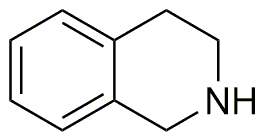1,2,3,4-Tetrahydroisoquinoline is widely utilized in research focused on:
- Pharmaceutical Development: This compound serves as a key intermediate in the synthesis of various pharmaceuticals, particularly those targeting neurological disorders. Its structural similarity to natural alkaloids makes it a valuable scaffold for drug design.
- Neuroscience Research: Researchers explore its potential neuroprotective effects, which can lead to breakthroughs in treating conditions like Parkinson's disease and depression. Its ability to modulate neurotransmitter systems is of particular interest.
- Organic Synthesis: It is employed in organic chemistry as a versatile building block for creating complex molecules. Its reactivity allows for the development of novel compounds with diverse applications in materials science.
- Natural Product Synthesis: The compound is used in the synthesis of isoquinoline derivatives, which are found in various natural products. This application is crucial for developing new bioactive compounds with medicinal properties.
- Analytical Chemistry: 1,2,3,4-Tetrahydroisoquinoline is utilized in analytical methods for detecting and quantifying isoquinoline derivatives in complex mixtures, aiding in quality control and research.
Informations générales
Propriétés
Sécurité et réglementation
Applications
1,2,3,4-Tetrahydroisoquinoline is widely utilized in research focused on:
- Pharmaceutical Development: This compound serves as a key intermediate in the synthesis of various pharmaceuticals, particularly those targeting neurological disorders. Its structural similarity to natural alkaloids makes it a valuable scaffold for drug design.
- Neuroscience Research: Researchers explore its potential neuroprotective effects, which can lead to breakthroughs in treating conditions like Parkinson's disease and depression. Its ability to modulate neurotransmitter systems is of particular interest.
- Organic Synthesis: It is employed in organic chemistry as a versatile building block for creating complex molecules. Its reactivity allows for the development of novel compounds with diverse applications in materials science.
- Natural Product Synthesis: The compound is used in the synthesis of isoquinoline derivatives, which are found in various natural products. This application is crucial for developing new bioactive compounds with medicinal properties.
- Analytical Chemistry: 1,2,3,4-Tetrahydroisoquinoline is utilized in analytical methods for detecting and quantifying isoquinoline derivatives in complex mixtures, aiding in quality control and research.
Documents
Fiches de données de sécurité (FDS)
La FDS fournit des informations de sécurité complètes sur la manipulation, le stockage et l’élimination du produit.
Spécifications du produit (PS)
Le PS fournit une description complète des propriétés du produit, notamment sa composition chimique, son état physique, sa pureté et les exigences de stockage. Il détaille également les plages de qualité acceptables et les applications prévues du produit.
Certificats d'analyse (COA)
Recherchez des certificats d'analyse (COA) en saisissant le numéro de lot du produit. Les numéros de lot et de lot se trouvent sur l'étiquette d'un produit, après les mots « Lot » ou « Lot de fabrication ».
Numéro de catalogue
Numéro de lot/série
Certificats d'origine (COO)
Ce certificat d'exploitation confirme le pays dans lequel le produit a été fabriqué, et détaille également les matériaux et composants utilisés et s'il est issu de sources naturelles, synthétiques ou autres sources spécifiques. Ce certificat peut être requis pour les douanes, le commerce et la conformité réglementaire.
Numéro de catalogue
Numéro de lot/série
Fiches de données de sécurité (FDS)
La FDS fournit des informations de sécurité complètes sur la manipulation, le stockage et l’élimination du produit.
DownloadSpécifications du produit (PS)
Le PS fournit une description complète des propriétés du produit, notamment sa composition chimique, son état physique, sa pureté et les exigences de stockage. Il détaille également les plages de qualité acceptables et les applications prévues du produit.
DownloadCertificats d'analyse (COA)
Recherchez des certificats d'analyse (COA) en saisissant le numéro de lot du produit. Les numéros de lot et de lot se trouvent sur l'étiquette d'un produit, après les mots « Lot » ou « Lot de fabrication ».
Numéro de catalogue
Numéro de lot/série
Certificats d'origine (COO)
Ce certificat d'exploitation confirme le pays dans lequel le produit a été fabriqué, et détaille également les matériaux et composants utilisés et s'il est issu de sources naturelles, synthétiques ou autres sources spécifiques. Ce certificat peut être requis pour les douanes, le commerce et la conformité réglementaire.


